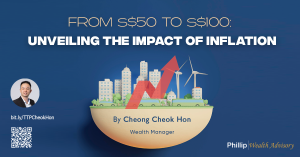Understanding 3 Key Risks of REITs and Adding S-REITs to Your Portfolio April 19, 2018

In the past decade, REITs in Singapore have become increasingly popular as an investment vehicle. Not only are they a solid choice for dividend income, they also have the potential to appreciate in price to yield additional capital gains. However, as with any investment, there are always risks involved when it comes to investing your hard earned money in them. In this week’s write up, we will go through three common risks that people tend to overlook when investing in REITs.
Volatility Risk
Typically, investors believe that REITs are stable in both price and dividend distributions. While this is true to some extent, we should be wary of market conditions that may change overnight. We need to look no further than May 2013 when markets reacted violently to what is now famously known as the “Taper Tantrum”. REIT prices were not spared from this – as you can see in the example below:

A close to 30% drop on AIMSAMP Cap Reit during the Fed’s Taper Tantrum
Debt Risk
While there are measures in place to protect the interest of REIT holders in Singapore (i.e. maximum aggregate leverage of 45%), investors have to be wary on the effects of debt on the balance sheet. When a REIT uses debt to finance their acquisitions, they may not have the financial ability to build up enough cash to repay the debt when it’s due. This may result in the REIT refinancing their debt, possibly with a higher interest rate. Higher interest rates result in higher borrowing costs which may cause the REIT distribution per unit (DPU) to drop. In a doomsday scenario, if the REIT is unable to secure refinancing to make good its loan repayments, it will have to liquidate its assets/properties to pay off the loan. Investors looking at this matrix can review the debt maturity profile of the Trust, which is often shown in their quarterly results. Having a significant level of maturing debt in a single year is a red flag that investors would need to pay more attention to.
Concentration Risk
Concentration risk can come in many forms, but we’re mainly concerned about two major ones. Firstly, does the REIT derive most of its value from only a few assets/properties? If anything does happen to the property, the REIT valuation will take a big hit. Similarly, does the REIT derive rental income from only one major tenant? Are there tenancy agreements that may cause the rental income to become variable? What will happen if the tenant decides to switch out from that property into another one and how would it affect the current DPU of the REIT? Investors will have to be prudent about these issues when choosing a particular REIT for investment.
What can an investor do?
There are many other risks involved with investing in REITs which we have not covered in this article. We understand that it is hard for retail investors to perform an in-depth analysis and/or due diligence of the REIT in question and even harder to time the market.
For investors who do not have the time and want to get into REITs as an investment, you can consider Lion-Phillip S REIT ETF as an alternative investment tool to directly buy into a basket of more than 20 SGX listed REITs at a low cost. This will allow you to diversify your investments immediately, reducing the overall concentration risk. Another good reason to consider getting into this now is because our local tax authority is removing the tax on distributions for S-REIT ETFs (previously 17%), so your dividend income from the ETF will not be penalised.
Timing a market is not as easy as it seems. The market is driven by events that nobody can predict, and these can include unexpected rate hikes, change in tariff policies etc. The Share Builders Plan we have here in Phillip is a great way to filter out all these events by dollar cost averaging. This is good for investors who have a long investment horizon.
You may find out more details for the ETF and our Share Builders Plan at the following links:
http://www.lionglobalinvestors.com/en/funds/lion-phillip-s-reit-etf/index.html
https://www.poems.com.sg/rsp/#sbp
If you wish to know more about investing, feel free to approach your designated Trading Representatives or our friendly Representatives at a Phillip Investor Centre near you.
Disclaimer
These commentaries are intended for general circulation. It does not have regard to the specific investment objectives, financial situation and particular needs of any person who may receive this document. Accordingly, no warranty whatsoever is given and no liability whatsoever is accepted for any loss arising whether directly or indirectly as a result of any person acting based on this information. Opinions expressed in these commentaries are subject to change without notice. Investments are subject to investment risks including the possible loss of the principal amount invested. The value of the units and the income from them may fall as well as rise. Past performance figures as well as any projection or forecast used in these commentaries are not necessarily indicative of future or likely performance. Phillip Securities Pte Ltd (PSPL), its directors, connected persons or employees may from time to time have an interest in the financial instruments mentioned in these commentaries. Investors may wish to seek advice from a financial adviser before investing. In the event that investors choose not to seek advice from a financial adviser, they should consider whether the investment is suitable for them.
The information contained in these commentaries has been obtained from public sources which PSPL has no reason to believe are unreliable and any analysis, forecasts, projections, expectations and opinions (collectively the “Research”) contained in these commentaries are based on such information and are expressions of belief only. PSPL has not verified this information and no representation or warranty, express or implied, is made that such information or Research is accurate, complete or verified or should be relied upon as such. Any such information or Research contained in these commentaries are subject to change, and PSPL shall not have any responsibility to maintain the information or Research made available or to supply any corrections, updates or releases in connection therewith. In no event will PSPL be liable for any special, indirect, incidental or consequential damages which may be incurred from the use of the information or Research made available, even if it has been advised of the possibility of such damages. The companies and their employees mentioned in these commentaries cannot be held liable for any errors, inaccuracies and/or omissions howsoever caused. Any opinion or advice herein is made on a general basis and is subject to change without notice. The information provided in these commentaries may contain optimistic statements regarding future events or future financial performance of countries, markets or companies. You must make your own financial assessment of the relevance, accuracy and adequacy of the information provided in these commentaries.
Views and any strategies described in these commentaries may not be suitable for all investors. Opinions expressed herein may differ from the opinions expressed by other units of PSPL or its connected persons and associates. Any reference to or discussion of investment products or commodities in these commentaries is purely for illustrative purposes only and must not be construed as a recommendation, an offer or solicitation for the subscription, purchase or sale of the investment products or commodities mentioned.
About the author
Edwin Choo
Securities Dealer
Mr Edwin Choo is a securities dealer that is part of the HQ dealing team. As an securities dealer, he specialises in providing equity-related advisory for clients. His personal objective is to ensure that all clients are able to make sound investment decisions to maximise their investment returns. He applies a wide range of techniques to analyse securities, both technical and fundamental, and he believes that only with a combination of both can an investor make a clearer decision on an investment.
Edwin is frequently looking at different trading ideas and often shares his strategies and market insights with his clients. He is also actively engaged in monitoring portfolios for his clients and is constantly thinking of new ways to improve their equity portfolios and return on investment.
Edwin holds a Bachelor of Business Degree (Hons), majoring in Banking and Finance from Nanyang Technological University.

 Back in Business: The Return of IPOs & Top Traded Counters in March 2024
Back in Business: The Return of IPOs & Top Traded Counters in March 2024  From $50 to $100: Unveiling the Impact of Inflation
From $50 to $100: Unveiling the Impact of Inflation  How to soar higher with Positive Carry!
How to soar higher with Positive Carry!  Why 2024 Offers A Small Window of Opportunity and How to Position Yourself to Capture It
Why 2024 Offers A Small Window of Opportunity and How to Position Yourself to Capture It 









